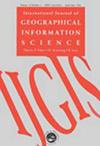Content-location relationships: a framework to explore correlations between space-based and place-based user-generated content
IF 4.3
1区 地球科学
Q1 COMPUTER SCIENCE, INFORMATION SYSTEMS
International Journal of Geographical Information Science
Pub Date : 2023-06-27
DOI:10.1080/13658816.2023.2213869
引用次数: 0
Abstract
Abstract The use of social media and location-based networks through GPS-enabled devices provides geospatial data for a plethora of applications in urban studies. However, the extent to which information found in geo-tagged social media activity corresponds to the spatial context is still a topic of debate. In this article, we developed a framework aimed at retrieving the thematic and spatial relationships between content originated from space-based (Twitter) and place-based (Google Places and OSM) sources of geographic user-generated content based on topics identified by the embedding-based BERTopic model. The contribution of the framework lies on the combination of methods that were selected to improve previous works focused on content-location relationships. Using the city of Lisbon (Portugal) to test our methodology, we first applied the embedding-based topic model to aggregated textual data coming from each source. Results of the analysis evidenced the complexity of content-location relationships, which are mostly based on thematic profiles. Nonetheless, the framework can be employed in other cities and extended with other metrics to enrich the research aimed at exploring the correlation between online discourse and geography.内容-位置关系:探索基于空间和基于地点的用户生成内容之间相关性的框架
摘要通过支持GPS的设备使用社交媒体和基于位置的网络为城市研究中的大量应用提供了地理空间数据。然而,在地理标记的社交媒体活动中发现的信息与空间背景的对应程度仍然是一个争论的话题。在本文中,我们开发了一个框架,旨在基于基于嵌入的BERTopic模型识别的主题,检索来自地理用户生成内容的天基(Twitter)和基于地点(Google Places和OSM)来源的内容之间的主题和空间关系。该框架的贡献在于所选择的方法的组合,以改进以前专注于内容-位置关系的工作。使用里斯本市(葡萄牙)来测试我们的方法,我们首先将基于嵌入的主题模型应用于来自每个来源的聚合文本数据。分析结果证明了内容-位置关系的复杂性,这些关系主要基于主题简介。尽管如此,该框架可以在其他城市使用,并与其他指标一起扩展,以丰富旨在探索网络话语与地理之间相关性的研究。
本文章由计算机程序翻译,如有差异,请以英文原文为准。
求助全文
约1分钟内获得全文
求助全文
来源期刊
CiteScore
11.00
自引率
7.00%
发文量
81
审稿时长
9 months
期刊介绍:
International Journal of Geographical Information Science provides a forum for the exchange of original ideas, approaches, methods and experiences in the rapidly growing field of geographical information science (GIScience). It is intended to interest those who research fundamental and computational issues of geographic information, as well as issues related to the design, implementation and use of geographical information for monitoring, prediction and decision making. Published research covers innovations in GIScience and novel applications of GIScience in natural resources, social systems and the built environment, as well as relevant developments in computer science, cartography, surveying, geography and engineering in both developed and developing countries.

 求助内容:
求助内容: 应助结果提醒方式:
应助结果提醒方式:


